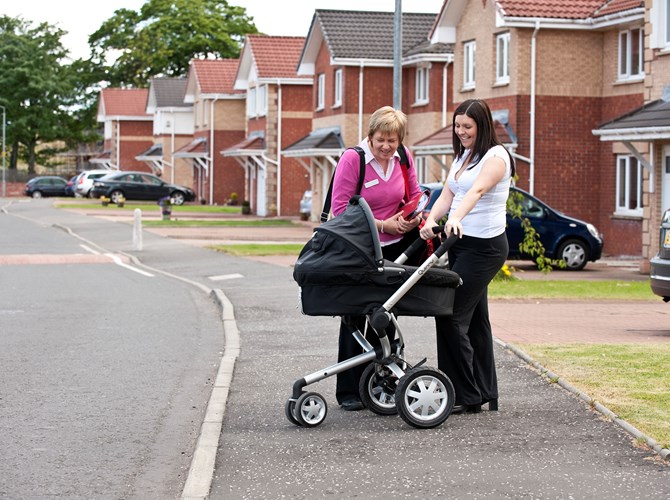Previous
Midwife
To become a health visitor, you must be registered with the Nursing and Midwifery Council (NMC) as a nurse or midwife. You can then apply for an approved health visitor training programme.
Health visitors are registered nurses or midwives who have undertaken further study at masters level to become registered health visitors.
They work in the community to provide a proactive and universal service to families with young children. They are healthcare specialists who contribute heavily to the well-being of children and families.
Health visitors aim to support and empower families to promote health and well-being by visiting them in their own home. They provide parents with advice so they can give their child the best possible start in life.
Health visitors work with NHSScotland principles and goals to tackle health inequalities and deprivation. They work to stop children and families becoming vulnerable or at-risk.

To get on a course to become a health visitor, you must become a registered nurse or midwife first. You'll need a good standard of education to get into a pre-registration nursing or midwifery university degree programme. Useful subjects include:
Speak to your guidance teacher about subjects offered at your school.

You may find it helpful to get some healthcare experience by doing a work placement or volunteering. You’ll get training, increase your knowledge, and learn new skills. This could help you when applying to university, college or a new job with NHSScotland.
Most universities accept a wide range of qualifications for nursing or midwifery, giving you the option of applying directly from school or going to college first.
At college, you can do an HNC in Healthcare Practice, which could lead to an undergraduate pre-registration nursing or midwivery degree.
Widening participation supports adult learners who want to go to university. If you’re an adult with few or no qualifications, you could get into higher education through the Scottish Wider Access Programme (SWAP). Many universities also provide access programmes to help you get the degree entry qualifications you need.
To become a health visitor, you must be registered with the Nursing and Midwifery Council (NMC) as a nurse or midwife. You can then apply for an approved health visitor training programme.
To gain entry to the approved courses, you should be educated to a degree level. However, some universities will take previous academic credit, or prior learning into account.
The following approved Scottish universities that offer postgraduate programmes in Specialist Community Public Health Nursing – Health Visiting are:
You will visit families in their own home and provide health advice and support to empower parents to care for their children. Your health visiting practice will be based on the universal health visiting pathway:
Although your focus of health visiting will be on young children, you will have to build a solid bond with the whole family.
You’ll have to engage with families to discover and build on their strengths. It will also be your responsibility to understand their concerns and health needs and deal with it in a safe and supportive manner.
Tasks include:
You'll need these skills:
Health visitors work with other health and socail care professionals, including:
You could work in:
When you begin your career as a health visitor, you will go through an induction provided by your recruiting NHSScotland board. This will familiarise you with the systems and services available. There will also be training available to develop your skills in areas such as:
Using the skills gathered as a practicing health visitor, you can progress in your career.
You may decide to become a team leader or team manager. You would be responsible for managing and providing clinical supervision to teams of health visitors and other community staff. You’ll need relevant experience and a masters degree, or equivalent qualification is usually required for this role.
You could also develop specialist areas of interest, such as working with families with specific health and social needs. You may have to undertake specialist planning and work with other agencies. You’ll also give training and clinical supervision to health visitors and students.
You could move into a leadership role. Health visitors can be supported into leadership roles through the NHS Leadership Academy. They also offer a programme for frontline nurses and midwives to develop their skills.
Revalidation is a process that nurses need to follow to maintain their registration with the NMC every 3 years.
It is an ongoing process throughout your career as a nurse and aims to:
Visit the NMC website to find out more about revalidation.
Health visitors must be registered with the Nuring and Midwifery Council to work in the NHS.
Find out more about the Nursing and Midwifery Council (NMC).

Discover the skills and qualifications you’ll need for each role and what the work will be like.
Explore careers
Our blog includes how-to guides, case studies, and career resources.
Discover more